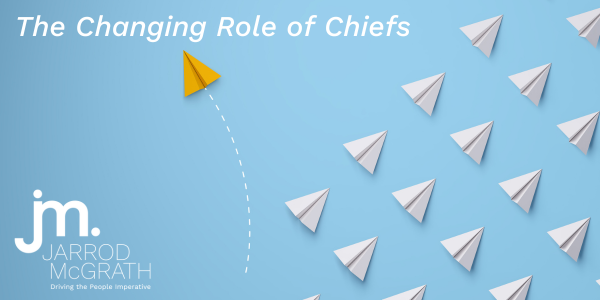Lessons Learned Implementing WFM: Organisational Change
As a Workforce Management Consultant at Smart WFM, I encounter various challenges in my role, with one of the most significant being organizational...

Today’s board rooms are filled with words like ‘agility,’ ‘disruption,’ and ‘innovation’. Yet this is often a far cry from the language of the modern CEO, which is less about profit and more about people and purpose. Having said that, none of these are, or ever should be, mutually exclusive. I realised this from my own experience as a CEO but it was powerfully reinforced when interviewing 15 leading CEO’s from around the world for my latest book.
Having spent the last two decades working closely with the corporate world, and observing a seismic shift in the role of the corner office, I’ve discovered we’re facing an era of profound change in how CEOs operate.
Historically, the world of business offered a relative sense of stability. Innovation was a slow-paced game, and the variables of people, processes, and technology existed in somewhat predictable patterns.
Fast forward to today, the speed and unpredictability of change have increased exponentially, placing an intense demand on CEOs to comprehend and navigate an intricate web of social, economic, and environmental considerations.
Where once CEOs could focus primarily on shareholder returns, today’s leaders face the challenge of balancing a wider set of demands. As CEOs, we're tasked with taking care of our people, their families, our communities, and the longevity of our planet.
We find ourselves at the confluence of people, processes, technology, and ever-changing environments. We're expected to understand these complexities and make decisions that align with the interests of various stakeholders – investors, employees, customers and policymakers.
CEOs have become significant influencers in the world's $100 trillion global economy, with our actions rapidly swaying public sentiment. Consider the impact of decisions made by OzHarvest CEO Ronni Kahn and Qantas CEO Alan Joyce during the pandemic, or UKG's then president Chris Todd addressing the gender pay gap with the US National Women's Soccer League. Each choice they made garnered significant media attention and had far-reaching consequences.
When I interviewed 15 diverse CEOs from Australia, South-East Asia, the US and Europe, I found the role of the modern CEO pivots around four central themes: purpose, leadership, people, and operations.
Firstly, purpose. A CEO must comprehend the organisation's raison d'être and its broad impacts. In a world grappling with issues like climate change, social inequality, and digital transformation, CEOs must articulate a purpose that resonates with their people and drives economic value.
Secondly, leadership. Modern CEOs must ensure their leadership teams are aligned with the organisation's purpose and possess the necessary skills to deliver it. CEOs must be digitally adept, capable of building a culture that encourages systemic thinking, and ready to confront future challenges, whatever they may be.
Thirdly, people. A company's most significant asset and differentiator is its people. CEOs must unlock their people’s passions, aligning them with the company's purpose. Building a culture of trust, transparency, and inclusivity is paramount. Today's CEOs must also acknowledge that their workforce seeks more flexibility and a commitment to diversity, equity, inclusion, and belonging.
Lastly, operations. CEOs need to ensure their organisations are simplified, efficient, and effective. This includes harnessing digital technology, utilising rich data insights, and innovating to ensure financial viability.
This understanding forms the backbone of what I call the 'Modern CEO Framework,' a guide for CEOs to navigate this complex landscape.
Throughout my interviews, I discovered that the pathway to the CEO’s office is no longer exclusively reserved for those with a privileged background, a top-tier education, or the ‘right connections.’ Instead, I found commonalities that were far from materialistic. The drive to create, challenge the status quo, constantly learn, and improve are traits that connect CEOs from disparate fields.
You can’t be everything to everyone. The only way you can be successful is to have a diverse, open-minded, purpose-driven, future-thinking team of people around you. Your future and your people’s future depend on this.
For instance, Ben Bowen, the first Indigenous CEO of the Indigenous Literacy Foundation, applies a holistic system thinking approach ingrained in his Indigenous heritage. He brings a pragmatic perspective to the importance of a commercial focus while advancing his organisation's purpose.
Then there’s Chris Wilesmith, Group CEO and Managing Director of Jaycar Group, who brings a team-first, customer-centred approach to leadership. He applies his passion for climbing and cycling to push his teams and company to new heights.
CEOs no longer have the luxury of being solely experts in one domain. The necessity of understanding the intersections of various fields – be it technology, finance, human resources, or sustainability – has never been greater. No matter how advanced technology gets, it’s the human element that continues to be the key differentiator for businesses. As such, CEOs need to invest not only in their personal growth but also in the wellbeing and development of their teams.
It's this amalgamation of strategic insight, empathetic leadership, and a commitment to purposeful growth that separates the modern CEO from the traditional. As we move forward into an increasingly complex, globalised, and digital world, these skills will become even more essential.
So, let's step into this new era of leadership with clarity, resilience, and an open heart – for it's not just about surviving in this new environment but thriving in it.

As a Workforce Management Consultant at Smart WFM, I encounter various challenges in my role, with one of the most significant being organizational...

I’m writing this article on a plane bound for Las Vegas, to attend the 20th Annual HR Technology Conference and Expo. It will no doubt be a difficult...